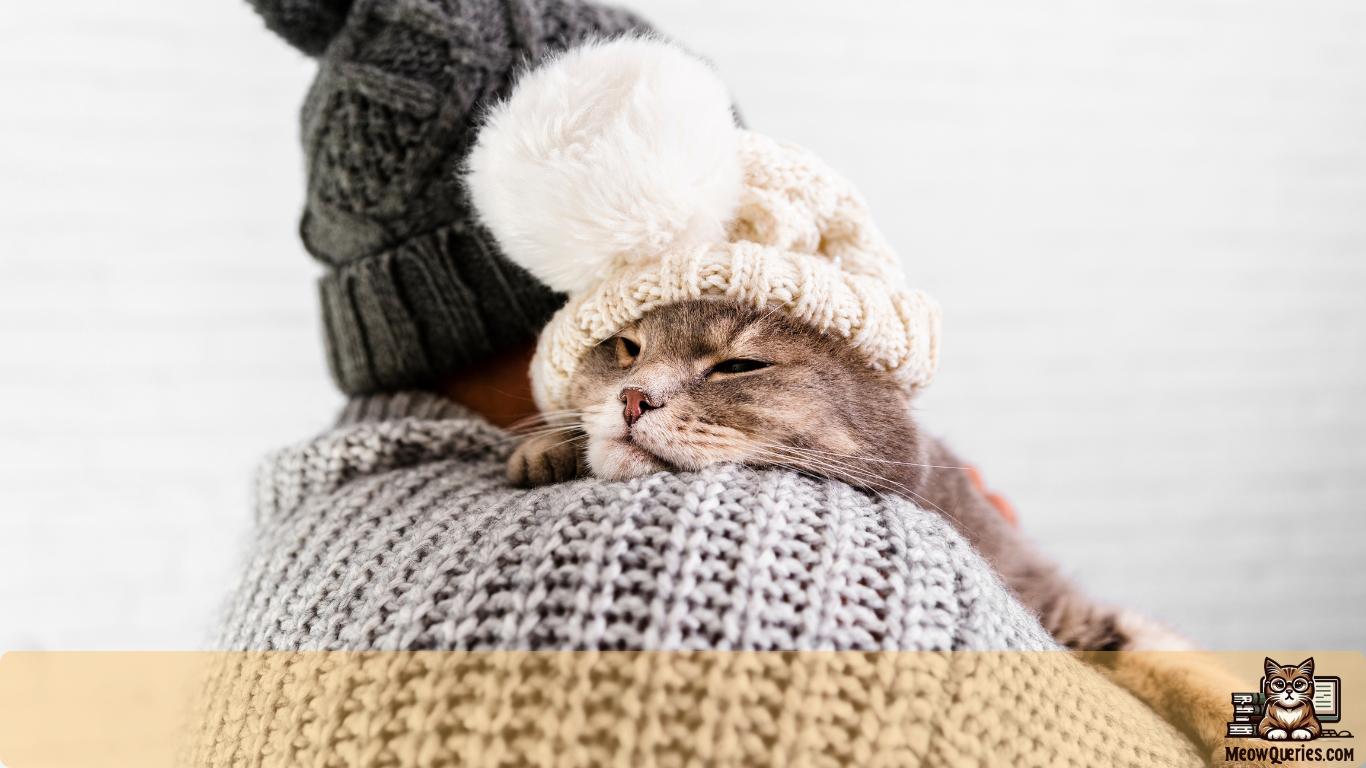
Many times, people notice their cat sneezing, and because of that, they doubt that can cats get a cold? just like humans. You may also see your cat sneezing, runny nose, and watery eyes. All these symptoms are common signs of cats’ upper respiratory infections (URI), or maybe it is a sign of a cold. There are many different reasons why your cat gets cold, and many of the reasons are really dangerous.
Can humans get cold from cats?
This is a question that comes to everyone’s mind like a cold spreads in humans from each other. Many people also think that humans can get cold from cats. Well, the answer to this question is no; you cannot get cold from a cat. Another question that people have is whether cats get cold from humans. Now, this is also a trending question, and the answer is no. There is no way that a cat will get a cold from a human.
You may also like: Maine Coon Cat Colors
Can colds spread from one cat to another?
It is possible that a cold can spread from one cat to another, but it depends upon many factors. If it is cold, then there are strong chance that it can spread to other cats, but if it is a respiratory infection, then there is no problem with it spreading to another cat.
How Do cats get the cold?
Many people think that cats catch colds from cold weather. Well, that is not the case. Cold weather can only weaken a cat’s immune system if you do not provide it with the nutrition it needs. Otherwise, if your cat is healthy, then there is no danger.
Cats usually get the cold because of viruses, and commonly, it is also bacterial infections. One of the worst cases is that your cat can get a secondary bacterial infection with the viral illness which can be really dangerous. The most common viruses that cause the cold in cats are calicivirus and Feline herpesvirus or rhinotracheitis.
What are the symptoms of cold in cats?

There are many cat cold symptons that you can notice in your cat if its suffering from cold. Below are the common systems mentioned of cat suffering from cold.
- Sneezing
- Nasal congestion or runny nose
- Swollen, Red, or runny eyes; squinting
- Coughing, hypersalivation
- Ulcers on the lips, tongue, nose, or roof of mouth
- Fever
- Lack of appetite
- Decreased energy
- Dehydration
- Enlarged lymph nodes
These symptoms can last about one to two weeks.
When should you see a vet?
If your cat’s condition is not getting better even if you are providing some home remedies then it is really important that you go an animal hospital or animal clinic and get an appointmnet from a vet because they can recognize why your cat is in this condition and can give the medicine that can cure the viruses and bacterial infections.
Treatment For Cold Virus in cats?
In the points below, we have mentioned the treatment that you should offer your cat if it has a cold.
- You have to provide a warm and quiet space for your cat so that it can recover.
- You also have to separate the cat from the other beds to reduce the stress.
- It is best to feed canned foods to your cat and slightly warm them. This will help stimulate your cat’s appetite.
- Also, clean the nose and the eyes of your cat from time to time with warm clothes.
- It is important that you never use the human cold medications on your cat.
How to Prevent Colds in Cats?
Below is the point that you just follow if you want to prevent your cat from getting cold.
- The first and most important thing is to vaccinate your cat according to the veterinarian’s recommendations. The RCP vaccine is best for providing immunity against Calicivirus and rhinotracheitis. Chlamydia is also included in some of the vaccines. Cats who are vaccinated for all these diseases have a very low chance of getting a cold.
- The other thing you can do is keep your cat away from infected cats, outdoor cats, or cats with an unknown health history. The best thing you can do is keep your cat indoors all the time and only let it outside with you.
- It’s also important that you clean the place where your cat is living.
- In the end, it is important to feed your cat a balanced diet so that it will get all the nutrients it needs.
Can Cats Get Other Respiratory Infections?
Now, this is a really important question, and it needs to be answered in the best way possible. Below are the points that will provide you with information about all the feline upper respiratory infections that occur in cats.
- Different from a Cold: Other infections of the respiratory system in cats are invariably a result of more serious pathogens, including viruses like the feline herpesvirus and bacteria like Bordetella.
- Symptoms: Other respiratory infections may present symptoms similar to those of the common cold but may also include severe coughing, breathing difficulties, or eye infections.
- Diagnosis: It can be tricky to determine whether the pet’s sickness is just a common cold or some other infection with flu-like symptoms.
Home Remedies for Cats with Colds: Do They Work?

Yes, home remedies definitely work for your cat. Below are the ones that you can use if your cat has cold symptoms.
- Common Remedies: Some of the available treatments are using a humidifier, warming food and water, and adding honey to the diet to keep your cat warm.
- Effectiveness: Some remedies can alleviate symptoms, and they differ in their effectiveness, safety, and usage.
- Cautions: Home remedies must not be self-administered as they may cause side effects or impact the prescribed drugs.
How to Care for a Cat with a Cold: Tips and Tricks
Below are some tips and tricks you can follow to take care of your cat if it has a cold.
- Comfort: Make a cozy environment in which the cat feels as comfortable as possible to spend time after the procedure.
- Hydration: Make sure fresh water is available and feed wet food. This helps to retain water in the cat’s body.
- Nutrition: Provide a good feeding plan so as to help boost the cat’s immunity as well as aid its healing process.
- Monitoring: Monitor the cat’s condition and activity, as slight changes may be normal. If symptoms get more severe or other symptoms arise, the cat should be taken to a veterinarian.
- Hygiene: Isolate the litter box to avoid transferring sickness from one cat to the other, particularly when there are many cats.
Conclusion
So, if you have a question about whether cats can get a cold, then all the points are explained briefly in this article. Cats can definitely get cold, and there are various reasons why they can get it. You can use different home remedies to cure your cat’s cold as well. If the situation becomes serious, then you also have to go to a vet.
Frequently Asked Questions
Do Cat Colds Go Away on Their Own?
Answer: Yes, most cat colds can be cured naturally and may only take about one to two weeks to fade away, just like human colds. Look after your cat so that it does not freeze, and make sure it drinks water.
Can an Indoor Cat Get a Cold?
Answer: Well, yes, indoor cats can catch colds, often in the middle of the winter. They can get infected by other animals or by touching objects contaminated by a virus.
Can Humans Catch Colds from Cats?
Answer: No, the disease that humans get when they have a cold is different from the sickness that cats get when they have a cold. It means that you cannot catch a cold from your cat.
How to Tell if a Cat Has a Fever?
Answer: One sign a cat might be sick is that it has a fever, and therefore the cat may feel warm. You can use a digital thermometer to check their temperature, this should be around 100 ‘. 5-102. 5°F (38-39°C).
What Are the Signs of Cat Flu?
Answer: The manifestations of cat flu are sneezing, red or watery eyes, runny nose, coughing sometimes listlessness or loss of appetite.










